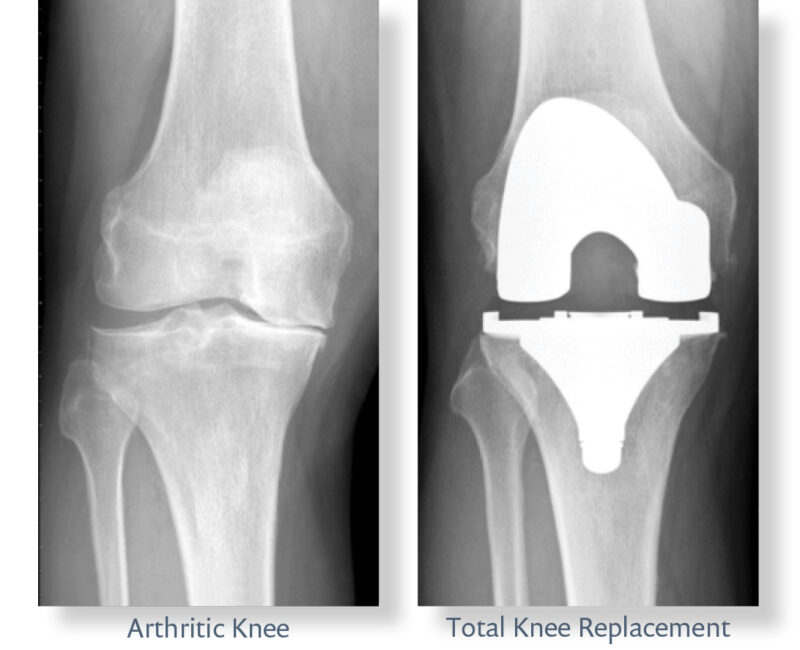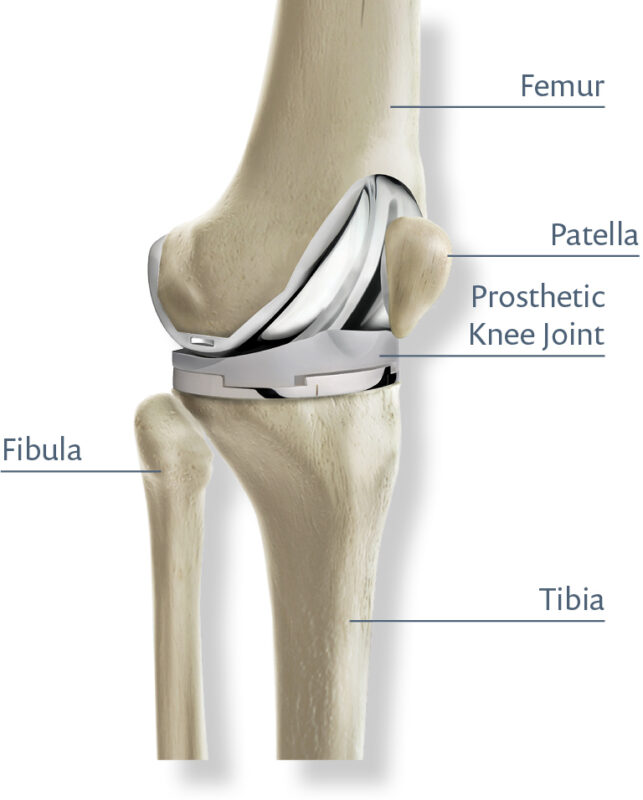Total Knee Replacement – What You Need to Know
Are you considering having total knee replacement surgery? Dr Dan Fick explains some of the things you might want to know before you decide to have surgery.
What Is a Total Knee Replacement?
A total knee replacement is a type of orthopaedic surgery designed to replace a worn out or damaged knee joint with an artificial joint known as a prosthesis or prosthetic joint.
You might hear a surgeon talking about total knee arthroplasty – this is another name for knee replacement.
Total knee replacement surgery is recommended for people with osteoarthritis, rheumatoid arthritis or disabling knee pain that has not improved with other treatments such as anti-inflammatory pain medication, physiotherapy or lifestyle changes like increased activity or weight loss.

Why Should I Consider Total Knee Replacement?
A knee replacement can reduce the joint pain you may have been experiencing, improve your mobility so you can walk and move around with ease, and improve your quality of life so you can get back to doing the things you enjoy.
What Happens During Total Knee Replacement Surgery?
In general, total knee replacement surgery takes about 1 hour. To have the surgery, you will need to have a local anaesthetic and a spinal anaesthetic which will numb your lower body during the procedure.

Knee replacement prosthesis
Total knee replacement surgery involves the removal of the damaged bone surfaces on the bottom of your femur (thighbone) and top of your tibia (shinbone). These are then resurfaced with an artificial prosthesis made of metal. A plastic liner is placed between the new metal parts. If the kneecap is also damaged, the worn surface is removed and resurfaced with a plastic button. Your skin is usually closed with dissolvable sutures and covered by a waterproof dressing.
What Are the Risks and Complications of Total Knee Replacement Surgery?
All surgery has some risks and your decision to have surgery should involve an informed discussion with us about how the benefits outweigh the potential downsides.
Here are some risks and potential complications of total knee replacement surgery that you should be aware of.
Infection:
This is a risk with any surgical procedure, but fewer than 1% of patients acquire a deep infection in the joint. In some cases, an infection may require additional surgery to clean out the joint or replace the implant.
Blood clots (deep vein thrombosis or DVT):
There is a risk of developing blood clots after any surgery, including total knee replacement. Blood clots can be serious and even life-threatening. Your medical team will help you to minimise the risk of blood clots by prescribing medications and/or using compression stockings.
Delayed wound healing:
This is most likely to occur in smokers and people with diabetes.
Pain and stiffness:
After a total knee replacement, some people may experience persistent knee pain or stiffness. This may be due to a variety of factors, including nerve damage, implant problems or other complications.
Arthrofibrosis:
This is a build-up of too much scar tissue after surgery. To increase your range of motion, you may require physiotherapy, injections, MUA (manipulation under anaesthetic) and/or microembolisation (which blocks the amount of blood flow to the area). As a guide, the best predictor of your range of motion after surgery is how well your range of motion was prior to the surgery.
Implant problems:
While total knee replacement implants are designed to last for many years, they can sometimes loosen or wear out over time. This may require additional surgery (known as revision surgery) to replace the implant.
Allergic reactions:
Some people may have an allergic reaction to the implant materials, medications used during the procedure, or other medical components such as suture material.
Nerve damage:
While rare, nerve damage can occur during knee replacement surgery, which can result in numbness or weakness in the affected leg.
Don’t feel intimidated by this list. We will prescribe medications and exercises to reduce these risks. It is important to discuss risks and voice any concerns you may have with our team before having total knee replacement surgery.
What Will My Recovery Be Like?
First 2–3 days:
After your operation, you will receive a nerve-blocking local anaesthetic that will numb part of the inside and front of your knee for 2–3 days. Your anaesthetist will also prescribe regular pain relief to help with any post-surgery pain.
First 2 weeks of recovery:
At home, you will continue the exercises we introduced at the hospital. Take plenty of breaks, eat high fibre foods to avoid constipation, eat small amounts of protein, drink plenty of water, keep up your pain relief and monitor your wound.
At about the 2-week mark:
You will see your GP or visit our dressing clinic to have your wound assessed.
About 3–6 weeks after surgery:
Most patients will still have discomfort, or report “not being able to get their leg in a comfortable position at night”. This begins to dissipate about 6–8 weeks after surgery.
At 4–6 weeks post-op:
You’ll have a follow-up appointment with Dan to assess your progress and recovery, and to discuss any questions you may have about your rehabilitation.
At 6 weeks:
Once your surgical wound has settled at around 6 weeks, it is safe to desensitise the scar by practising kneeling on a chair. It is safe to kneel, but many people find it uncomfortable due to scar irritation. If it feels uncomfortable at first, try it over time and it should get easier.
At 6–8 weeks:
Your pain and discomfort should be reduced by this stage.
6–12 months after surgery:
Continue to exercise to build strength in the muscles surrounding your knee. Riding a stationary bike is ideal for rehab after knee replacement surgery. Somewhere between 6 and 12 months after surgery, patients usually report that they feel their knee replacement has become ”a part of them” and less like a piece of metal in their body.
12 months after surgery:
You should have returned to normal and be able to tackle physically demanding activities.

